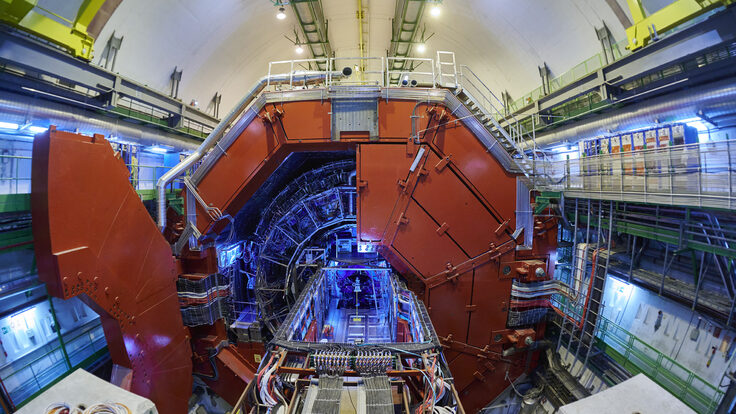Essay: Jennifer Ouellette
 |
| Photo courtesy of Jennifer Ouellette |
The Big Bang Theory
One of my favorite scenes in The Big Bang Theory involves the two main characters, Leonard and Sheldon, trying to move a large, flat box up two flights of stairs. Faced with no equipment and little upper-body strength, Leonard declares, “We are physicists! The intellectual descendents of Archimedes!” He proceeds to work the problem, tilting the box against the stairs, explaining (for the benefit of the studio audience) the mathematics of how that reduces the force required to lift the box.
I think of that scene whenever I hear a member of the physics community griping about the show and how it reinforces negative stereotypes of scientists. The premise is quite simple: Two nerdy physicists befriend the pretty blonde waitress who moves in next door, and wackiness ensues from the cultural clash. It's the show about physics that physicists love to hate: “How dare network television call us nerds for fun and profit!” But chances are the person griping hasn't even seen the show. And that's too bad, because The Big Bang Theory is actually a very smart, savvy series.
More importantly, the science is right on target–a rare accomplishment for a TV sitcom. Much of that is due to the efforts of UCLA physicist David Saltzberg, who serves as the show's technical consultant, painstakingly fleshing out the physics jargon in the dialogue and making sure the equations on the white boards lurking in the set's background are accurate.
When was the last time you were watching TV and the characters brought up the formula for determining the force required to push an object up a slope...and then used it to solve a practical problem? There are more obscure in-jokes, too: When Leonard spends the night with a brilliant female physicist, she “fixes” Sheldon's equation-in-progress by changing the sign, prompting Sheldon to gripe that now he'd have to share his Nobel Prize with her. Only PhD physicists familiar with QCD theory are likely to get that joke, yet there it is, on network television.
So it's not the science that physicists are likely to find problematic. It's the way the main characters are portrayed. Sheldon is a genius physicist with a serious case of Asperger's syndrome who needs cue cards to alert him to sarcasm in casual conversation, and arranges his breakfast cereals numerically according to fiber content. His other regularly appearing friends are no better. Leonard emerges as the sweet-natured counterfoil to his geeky compatriots, and much of the show's premise rests on whether he has a chance with the waitress Penny. Will she recognize Leonard's true romantic worth?
It's understandable that watching a shy, awkward physicist drooling over the stereotypical “ dumb blonde” might annoy some folks in the physics community. Why can't television portray scientists “accurately” instead of falling back on unfair stereotypes? That's the familiar refrain, but women could make the same complaint about Penny–who isn't nearly as stupid in later episodes as she is initially made out to be. The characters are evolving as the show develops, moving beyond the initial caricatures. The humor is evolving, too. It's more in the vein of good-natured teasing than outright ridicule, and it stems from a genuine fondness for geek culture. After all, Penny genuinely likes the geeky physicists next door.
Perhaps the humor raises some hackles because–like all good comedy–it contains an element of truth. We have all encountered physicists who fail to pick up on common social cues; who make inappropriate comments to attractive women; and who engage in animated, technical arguments on the difference between centrifugal and centripetal force, to the bemusement of any non-scientists who happen to be present. In another scene, the guys argue at length about the scientific inaccuracies contained in the first Superman movie. There are entire Web sites devoted to bad movie physics, and scientists are notorious for griping at length about minor technical inaccuracies in film and television.
Comedy is a funhouse mirror: It's an exaggerated reflection, to be sure, but it is still a reflection. If we don't like what the funhouse mirror shows us, maybe we need to change the reality. Only then will we see a change in the reflection. Or maybe we could just relax a little and learn to chuckle good-naturedly at our own human foibles. The physicists in The Big Bang Theory are likeable, even endearing. How can that be bad for physics?
Ultimately, the primary objective of any TV show is to entertain, not to teach. But humor is infectious. People can still come away with a tiny bit of physics insight, and a better appreciation for its relevance to our lives.
Jennifer Ouellette is the author of The Physics of the Buffyverse and Black Bodies and Quantum Cats: Tales from the Annals of Physics. She also blogs about science and culture at Cocktail Party Physics: http://twistedphysics.typepad.com.
Click here to download the pdf version of this article.






